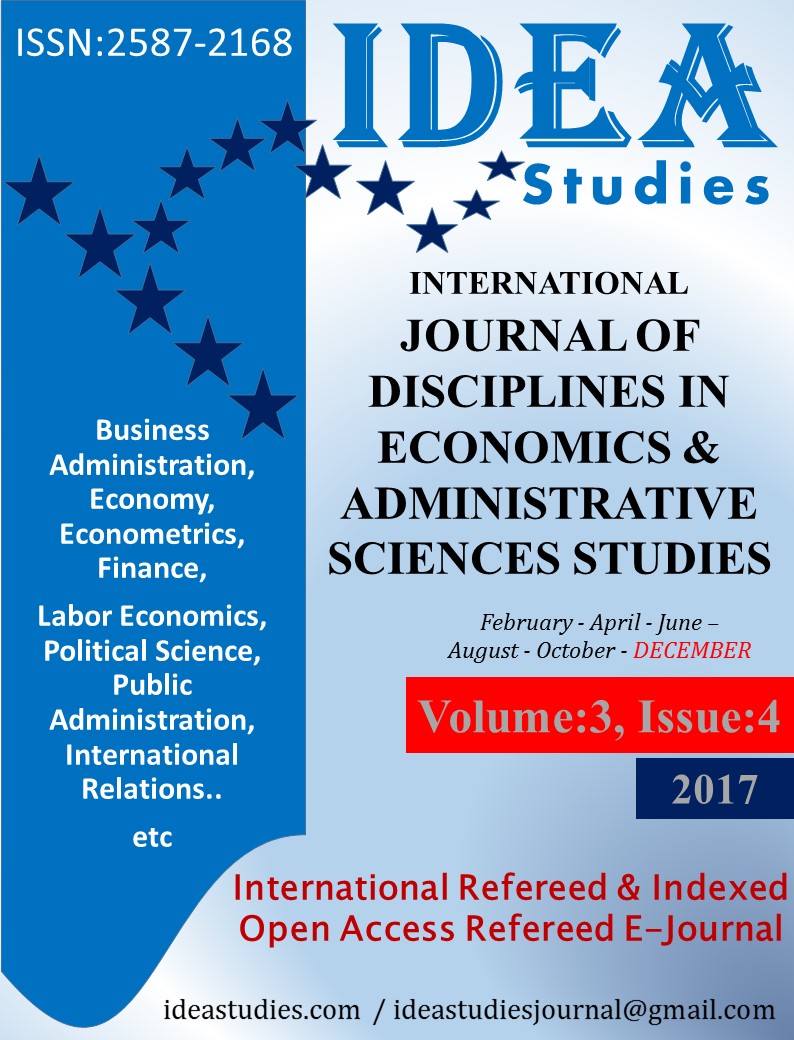TEKNOLOJİ KABUL DÜZEYİ İLE KARİYER PLANLAMASI ARASINDAKİ İLİŞKİ: ÜNİVERİSİTE ÖĞRENCİLERİ ÜZERİNE BİR UYGULAMA
Author :
Abstract
1970’li yıllardan beri giderek gelişen teknoloji ve teknolojik sistemlere adaptasyon gösterme sorunu, bireylerin teknoloji kullanımına yönelik tutum ve davranışlarının önemini ortaya çıkarmıştır. Teknoloji Kabul Modeli (TKM), kullanıcıların bilgisayar teknolojisini kabul etme ya da reddetme sebebini açıklama amaçlı geliştirilmiş bir modeldir. Kariyer kavramı, genellikle ilerleme ve yönetim basamaklarında yukarıya doğru yükselmeye elverişli işleri anlatmak için kullanılmaktadır. Kariyer planlama; bireylerin fırsatların, seçeneklerin ve sonuçların farkına varmalarını, kariyer hedeflerini belirlemelerini, bu hedeflere ulaşmada yön ve zaman tespiti yapmalarını sağlayacak iş, eğitim ve diğer geliştirmeye yönelik faaliyetleri programlama süreci olarak tanımlanabilir. Gelişen teknoloji ve getirdiği yenilikler, farklı çalışma alanları yaratmaktadır. Bu alanlardan yararlanırken nasıl bir yöntemin izlenebileceği gibi konulara ve sistemlere bireylerin teknoloji kabul düzeyleri etki edebilmektedir. Kahramanmaraş Sütçü İmam Üniversitesi İktisadi ve İdari Bilimler Fakültesi’ndeki İşletme Bölümündeki toplam yaklaşık 1200 öğrenciden kolayda örneklem yolu ile seçilmiş 300 öğrenciye anket uygulanmış ve 296 anketin geri dönüşü sağlanmıştır. Bu çalışmanın amacı öğrencilerin teknoloji kabul düzeyleri ile kariyer planlamaları arasındaki ilişkiyi belirlemektir. Anketlerden elde edilen veriler SPSS programı kullanılarak çeşitli analizlere tabi tutulmuş bunun sonucunda teknoloji kabul seviyesi ile öğrencilerin kariyer planlaması arasında anlamlı bir ilişki tespit edilmiştir.
Keywords
Abstract
The problem of adaptation to ever-evolving technology and technological systems since the 1970s has revealed the importance of individual attitudes and behaviors towards technology use. The Technology Acceptance Model (TAM) is a model developed to explain the reason why users accept or reject computer technology. The concept of career is often used to describe jobs that are suitable to rise up in the progress and management steps. Career planning can be defined as the process of programming jobs, training and other development activities that will enable individuals to recognize opportunities, options and outcomes, determine career goals, and determine direction and timing to achieve these goals. Developing technology and innovations create different working areas. Some subjects and systems such how a method can be followed can be affected by the level of technology acceptance of individuals. Questionnaires were conducted to 300 students randomly selected from an approximate 1200 students of Kahramanmaraş Sütçü İmam University, Department of Business in Faculty of Economics and Administrative Sciences. 296 surveys were returned. The aim of this study is to determine the relationship between technology acceptance levels and career planning of students. The data obtained from the questionnaires were subjected to various analyzes by using the SPSS program. As a result, significant relationship was determined between technology acceptance level and career planning.
Keywords
- Barutçugil, İ., 2002. Performans Yönetimi, Kariyer Yayınları, İstanbul, 288s.
- Barutçugil, İ., 2002. Performans Yönetimi, Kariyer Yayınları, İstanbul, 288s.
- Beach, 1975. Çalışma Yaşamında Kariyer Yönetimi, Planlaması, Geliştirilmesi, Sorunları, Çev: Aytaç, S., Ezgi Yayınevi, Bursa.
- Chau, P.Y.K., 1996. “An Empirical Assessment of a Modified Technology Aceptance Model.”, Journal of Management Information Systems, Vol.13, s. 185-204
- Davis, F.D., 1989, “Perceived Usefulness, Perceived Ease of Use, and User Acceptance of Information Technology”, MIS Quarterly Vol.13, s. 318–339.
- Davis, F.D., Bagozzi, R. ve Warshaw, P., 1989. “User Acceptance of Computer Technology: A Comparison of Two Theoretical Models”, Management Science, 35(8), s. 982-1003.
- Erdoğmuş, N., 2003. Kariyer Geliştirme Kuram ve Uygulama, Nobel Yayınları, Ankara, 272s. Eryiğit, S., 2000. “Kariyer Yönetimi”, Kamu İş Dergisi, 6(1).
- Hall, G. E., 1979. "The concerns-based approach to facilitating change". Educational Horizons, 57, 202–208.
- Hartwick, J. ve Barki, H., 1994. "Explaining the role of user participation in information system use". Managemenet Science, 40, 440–465.
- Igbaria, M., Guimaraes, T., ve Davis, G. B., 1995. "Testing the determinants of microcomputerusage via a structural equation model". Journal of Management Information Systems, 11(4), 87- 114.
- Karasar, N., 2003. Bilimsel Araştırma Yöntemi. Ankara: Nobel Yayın Dağıtım.
- Keller, C., 2005. “Virtual learning environments: three implementation perspectives”, Learning, Media and Technology, Vol.30, s.299-311.
- King, W.R. ve HE, J., 2006. “A Meta Analysis of The Technology Acceptance Model”, Information & Management, 43, 740-755.
- Lai, V.S. VE Li, H., 2005. “Technology Acceptance Model For Internet Banking: An Invariance Analysis”, Information & Management, Vol.42, s. 373-386.
- Landau, S. ve Everitt, S. B., 2004. A Handbook of Statistical Analyses using SPSS. Florida: CRC Press.
- Ölçer, F., 1997. İşletmelerde Kariyer Yönetimi, Amme İdaresi Dergisi, 30 (4): 87-103.Seçer, İ., 2003. SPSS ve LISREL İle Pratik Veri Analizi, Anı Yayımcılık, Ankara.
- Şimşek, M., Çelik, A., ve Akgemci, T., 2004. Kariyer Yönetimi, Gazi Kitapevi, Ankara, 439s.
- Vijayasarathy, L.R., 2004. “Predicting Consumer Intentions To Use On-Line Shopping; The CaseFor Augmented Technology Acceptance Model”, Information & Management, Vol.41, s.747-762.





